- Home
- Roger Zelazny
Changeling (Illustrated) Page 15
Changeling (Illustrated) Read online
Page 15
Some power lies there, beneath the ground, Moonbird remarked. This is the place?
Yes.
Pol scanned the skies carefully, then looked down once again. There was one break, at the pattern’s northern edge, where the strands billowed like an inkpot dropped into an aquarium.
Take us down at that far end, where the stand of trees comes in like a spear point, nearest to the thing.
Moonbird slowed and began his descent. Pol strained forward, studying the terrain. Soon, he saw that the marked area was an elaborate, monolithic construction, the dark lines representing a continuous overhead opening presumably running the entire length of many interconnected interior corridors for purposes of some small illumination. The structure itself stood perhaps twice his height above ground level. As they slowed to land, Pol saw the single pale jade strand he sought among the masses of sable and ochre lines. A faint bellowing noise reached his ears from some undeterminable point.
As he touched the ground, Moonbird asked:
Play me one more song.
Do you fear that you will never hear one again?
Humor an old sauroid servitor. Dragons have their reasons.
Very well.
Pol uncased his guitar, not even bothering to dismount.
“What are you doing?” Nora inquired.
“Request performance,” he answered, and he began a long, slow, nostalgic ballad.
Thank you, Moonbird replied, when it was finally concluded. That was soothing, and you reminded me of a story that a griffin once told me—
I’m afraid that I do not have the time to hear it now. More of those metal birds with bombs could—
Did you notice anything special as you sang?
No. What do you mean?
The bellowing sounds. They stopped.
Pol climbed down and assisted Nora in alighting. He patted Moonbird’s neck.
Thanks.
“How do you intend to approach this one?” Nora asked. “The same way as . . . ”
She had barely noticed the twirling motion of Pol’s left hand, two fingers extended, slightly bent. As they moved near to her face, it felt as if a black bandage were sliding across her eyes . . .
Pol caught her as she slumped, bearing her to a spot beneath the branches of the nearby trees, largely sheltered from overhead view.
Guard her while I’m inside, he told Moonbird. If more of those things show up, it would be better if you stay hidden here for so long as you are undetected.
I can break them.
But then Nora will be unprotected. No. Only fight if you are discovered.
Moonbird snorted and drops of spittle fell upon the ground and began to smolder.
Very well. I can at least listen to the music.
Pol turned away and approached the high, wide entrance. A snuffling, growling sound commenced somewhere within—distant or near, he could not be certain. It shifted about him, moving, growing, diminishing.
The corridor he had entered ended abruptly several paces before him. There was a lower, narrower opening to his right and the strand led directly into it.
He halted and hung the guitar by its strap. He began to play, a slow, lullaby-like tune, into which he poured a wrist-throbbing desire to calm, to charm any listener. Several strands drifted near and he caught them on the neck of the instrument and saw them grow taut and begin to pulse in time with the music.
Slowly, he turned, still playing, and entered the opening.
He found himself in a dim passageway, a narrow band of sky visible high above him, running like a blue brook to separate into several tributaries at a place where a number of corridors met. He stood still for a time, strumming and humming, letting his eyes adjust to the lesser light. He realized then that the snorts and snufflings had ceased, though there was now a sound of heavy breathing all about him.
He moved forward, following the pale green strand. He turned right when it did, and left and immediately left again. Two more paces bore him into a circular chamber, ten equidistant doorways in its walls, including the one from which he had just emerged.
His strand led through the one to the immediate right, though another section of it crossed the chamber, stretched between two other doors. He ignored this and followed it to the right.
There came a series of left-right, left-right, then left-left, right-right turns which left him dizzy. He paused to regain control of his music. The sounds of breathing still came heavily about him, filling all the passageways, accompanied now by a strong barnyard odor. A tiny bit of cloud drifted across the blue band above him. Switching to another tune—still languid, dreamlike—he continued on.
After a time, he entered a circular chamber with ten doors, following the strand across it. He felt that it was the same one through which he had passed earlier, because of a familiar pattern of cracks in the wall, but there was no trace of the green strand passing between the adjacent doors across the way.
Then, looking behind him, he realized that the jade strand was shrinking or being gathered before him as he progressed. It was then that it occurred to him that while the force within the object he sought made it easy to describe a spell that would lead him to it, finding his way back out again might be a little more difficult without such a goal.
He ducked and squatted as he traversed a low passage—hell of a place to get caught!—and turned sideways as he negotiated a narrow one. He then entered upon a fresh series of turns, most of them doubling back upon themselves.
How long? he wondered. Surely I don’t have to go through the entire thing . . .
Shortly thereafter, he realized that the breathing sounds had grown louder. And it was not long after that that he entered the long, low hall where the minotaur paced . . .
* * *
Mouseglove leaned forward again. The light in Mark’s penthouse had been out for the better part of an hour, yet he had learned by observation that the sometime flashing device which had replaced the man’s left eye was capable of very effective night-vision. He was also aware of Mark’s restless disposition, of his inclination to pace within his quarters, to burst suddenly forth and embark upon surprise inspections of his installations, his factories, the barracks, his laboratories, his fields.
Is it better to assume that sleep has claimed him? he wondered. He’s had a busy day. Still, he’s so full of nervous energy . . . He could come out at any time. Once he’s off and running again, it would be easy . . .
More maps than he really needed were folded in the various pockets of his cloak. The package containing the seven figurines was there, also. The grenades—about which he felt even more uncomfortable, having earlier witnessed their power—hung from his belt, along with one of his daggers. He carried a parcel containing food and a pistol he had stolen.
He leaned back behind the duct again and breathed more deeply of the chill and smoky night air. The longer he waited, of course, the greater the risk of discovery by one of the gnomes or machines. He was certain that he had spotted all of the stationary alarm devices, yet there were mobile units.
Still, he realized that he could not enter the flier and secure it about him without making some noise. Even if Mark were already sleeping, it would be well to let him drift further along into oblivion.
He looked up at the stars. The moon had not risen. Good for stealth. Less good for one’s first flight. He touched each grenade. He checked his supplies. He had no intention of being captured. Especially after having seen what they had done to that centaur they had brought in earlier. And he was convinced that the poor brute had not even understood what it was that they wanted to know.
Patience had long been a way of life with Mouseglove. He commenced massaging major muscles, pausing periodically to listen, to peer about him.
Over an hour went by.
Time, he decided. The belly of the night. Two hundred paces now. Slow and steady. Patron of Thieves, be with me. . . .
It was time to think of nothing, to be an eye, to be a
n ear, to breathe just so, to feel vibrations. The hatch would have to be on the side facing Mark’s door . . .
Twenty more paces, ten . . . What are they burning in those factories, anyway? It bites the nose . . .
He circled the vehicle twice, seeking alarms. Finally, he extended his hand, touched the smooth, cold body of the ship . . .
Now, little man, there is no retreat, he told himself.
He cracked the hatch, drawing slowly and steadily upon it. Silently, it came open. A moment later, he was inside, scanning the rooftop, seeking the hatch’s interior handle. There would be an unavoidable noise in closing it. He located the handle and pulled downward upon it until it was only opened a crack . . .
No!
The door to Mark’s apartment banged open and the man himself emerged. Mouseglove’s fingers outlined and dug for the pistol within his parcel on the seat beside him, There was not time in which he might take off, no way in which he could flee.
Yet, Mark did not immediately advance. He stood with his thumbs hooked behind his belt, studying the sky, the roof. Could it be that it was only the man’s insomnia which had brought him outside?
Mouseglove realized that he was holding his breath. He let it out slowly and took the pistol onto his lap. His left arm was beginning to tremble, from holding the door nearly closed against the tension of its spring.
. . . And don’t let it rattle, he appended to his latest prayer.
He located the trigger and raised the pistol. Abruptly, Mark buttoned his jacket and closed the door behind him. He began walking across the terrace.
I’d shoot him. Right now. If I could be sure of getting him. But I’ve never used one of these things. And already my grip is slippery upon it. I’d take the chance with a crossbow, if I had one. If this door were shut and the window down . . . if . . .
Mark passed within five meters, without even glancing at the flier. Mouseglove, deep within his cowl, crouched, arm aching, watched him go.
It was another ten minutes before he dared to slam the hatch and turn his attention to the controls.
* * *
Pol did not permit the music to falter. The man-beast’s eyes had passed over him several times as it moved slowly back and forth along the hall. It was well over two meters tall, with dark, curved horns. The room stank. Pol wondered what sort of teeth the creature possessed, with the head of a herbivore and the reputation he was still fresh on from his recent readings. He decided that he was willing to leave the question to sorcerers of a more academic bent. He turned his full attention to his playing.
Only his hands moved. He imagined that he plucked strands extending from the instrument to the horns of the beast. The force that grew within his wrist seemed to flow out through his fingertips, into the guitar, across the distance that lay between them.
. . . Rest. A nervous life such as yours requires some interlude of peace, he sent within the song. Not merely sleep, but the deep, muscle-easing joy of total rest that is almost pain, it is so sweet . . .
The minotaur slowed even more, finally coming to a standstill beside the wall. Even its awful breathing slowed
. . . Forget, forget the moment. The dream-sights dance already behind eyes that would close. Approach the cloud-strewn border of the land where visions dwell. They beckon . . .
The minotaur put out his right hand and leaned upon the wall. His head nodded. He snorted softly, once.
. . . Go, go to that place. There, skiey towers caressed by cool breezes make sweet the forgetting—and in fields of flowing green you wander. Delight spills across your body like a gentle rain. You bathe in the pools of healing. Bright colors fill your vision. There comes a song that brings you peace . . .
The creature knelt, lowered himself to the floor. His eyes closed.
Pol continued to play for a long while. There was little expression upon that sleeping face, other than a certain slackness. And the minotaur’s breathing had grown much slower and quieter. For the first time, Pol dared to look away from him, to trace with his eyes the path of the strand he had followed.
The green line led to a niche, high in the wall at the far end of the room. There were several clusterings of the darker strands about it, but these were far less elaborate than those he had encountered beneath the pyramid—and apparently cast where they were mainly for purposes of protecting the faintly glowing cylinder from molestation by the minotaur himself.
Pol moved quietly across the stone floor in that direction, his hands automatically continuing the melody as he studied the knottings of the spells. There were three of them, any one of which might have stopped the minotaur or an ordinary man. Yet, their undoing should take a competent sorcerer no more than—
He glanced back at the sleeping creature as he realized that he would have to stop playing in order to unwind the spells.
He reduced the tempo and strummed more softly.
. . . Sleep, sleep, sleep . . .
He stopped and lowered the instrument. His left hand twisted forward. When the first spell was undone, he glanced back and saw that the beast still slumbered.
As he worked on the second one, he heard a noise behind him, but at that moment he could not look away. Finally, it fell apart beneath his hands and he turned quickly, strands dispersing all about him.
The minotaur had only turned in its sleep.
He returned to the consideration of the final spell. It was no more difficult than the others. But he could not rush its untwining for the proper pace was as much a matter of necessity as the appropriate movements. His left hand darted, hooked and twisted. These last strands were colder than the others and, correspondingly, released a greater feeling of heat when they were at last undone.
Again, Pol looked back.
The minotaur’s eyes were open and staring at him.
Who are you?
A singer.
What do you want here?
A mere bauble.
The thing in the niche? It bites. Take care.
I shall. You do not mind that I take it?
Why should I? It is nothing to me. Where have I been?
Dreaming.
I had never been there before. There were bright things I’d never seen . . .
Colors?
Perhaps. Everything was good. Like never before. I want to go there again.
That can be arranged.
I want to dwell there forever.
Close your eyes then, and listen to the music.
The minotaur closed his eyes.
Bring this music and send me away . . .
Pol began to play, recovering all the visions which had come to him earlier. As he did, his eyes passed over the second section of the rod in its niche—longer, narrower than the first segment, bearing a scene of animals and men and woodland spirits, free of strife, dancing, eating, loving . . .
He struck the strings, reached out, seized the rod-section and fitted it into the first at his belt. Then he resumed playing as the minotaur still drowsed. He felt the increased warmth, the mightily enhanced sense of power that now twisted about the rod. As he played, he called upon it for a new usage and he felt that power move warmly through his abdomen, down his arm, into the guitar, to be joined with the music itself.
. . . Across the fields, where there is no strife, no hunger, no pain, where no one is a monster, where the light is soft, where the birds call and the brooks burble, where twilight comes on bringing stars like swarms of fireflies—to dwell there forever, never to awaken, never to depart—sleep, bull-man, in the peace you have never known—always, ever . . .
Pol turned away from the sleeper. He touched his wrist to the new section of the rod. Somewhere, buried in his unconscious, it seemed that there should be a record of every step, every turning he had taken on the way in. Therefore—
The dragon-image rose like a phoenix glowing above his wrist. Surely, it should be able to reach those buried memories.
Go! he commanded. I follow!
It dart
ed away from him, to depart the hall from the doorway nearest the niche, rather than the one through which he had entered.
He hesitated only a moment, then followed, smiling. So much for theory. He took it as a message that the forces his special sense reached and manipulated were not to be categorized in so facile a manner.
As he took his first turn beyond the doorway, he had his final glimpse of the sleeping minotaur, over his right shoulder. He saw the knot of his own spell drifting above the prostrate form, like a giant, yellow butterfly.
* * *
Mouseglove’s relief was immense as the ship cleared the highest tower and soared out, away from Anvil Mountain. Already, the lights of its city were small beneath him, and he was surprised to be taken by a sensation of beauty viewed as he looked upon it. Turning away, he continued to direct the vessel up past the regions where the dark bird-things wove their interminable patterns. So far, there was no indication of pursuit. He pushed the ship to its ultimate speed and held it there until the mountain was only a dim outline behind him. At last, this, too, faded and only the stars gave him light.
Then he relaxed, unclasping his cloak and letting it fall over the back of his seat. He sighed and rubbed his eyes and ran his fingers through his hair. A great tension began draining away, and the beginnings of delight in the act of flying under his own control came over him.
Soon . . . At this speed, he would be in Dibna before morning. That would provide ample time for hiding the vessel and walking into town. In a day’s time, he should be able to locate a buyer or a middle-man for the disposition of the figurines. Unless, of course, the men who had commissioned their theft were still alive, still wanted them. Either way . . . A few days more, possibly, to tie up the deal. Then, his purse full of coins, he would treat himself to a bit of revelry. After that, use the flying machine to travel to another town where no one would know of the transaction. In fact, it might be best to do that before celebrating. Then find a place to settle down. A villa on a hillside, with a view of the sea. A cook, a manservant, a gardener—it would be pleasant to have a garden—and a few assorted slave girls . . .

 Seven Tales in Amber
Seven Tales in Amber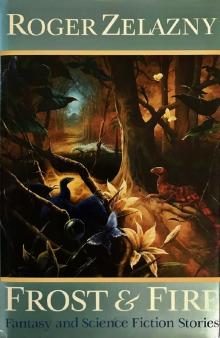 Frost and Fire
Frost and Fire Doorways in the Sand
Doorways in the Sand Unicorn Variation
Unicorn Variation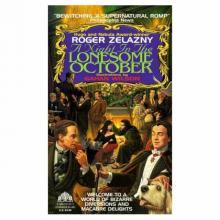 A Night in the Lonesome October
A Night in the Lonesome October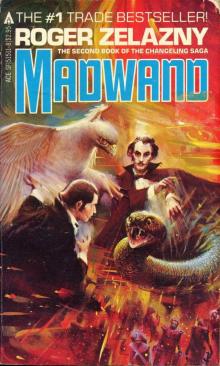 Madwand
Madwand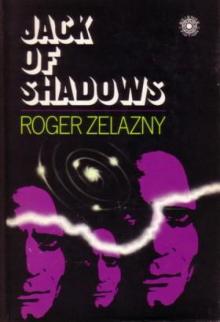 Jack Of Shadows
Jack Of Shadows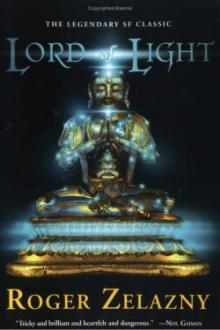 Lord of Light
Lord of Light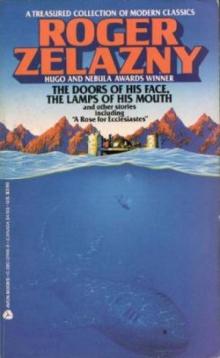 The Doors of His Face, The Lamps of His Mouth and Other Stories
The Doors of His Face, The Lamps of His Mouth and Other Stories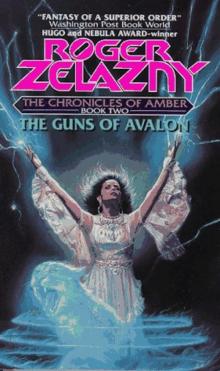 Guns Of Avalon tcoa-2
Guns Of Avalon tcoa-2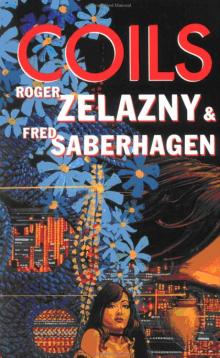 Coils
Coils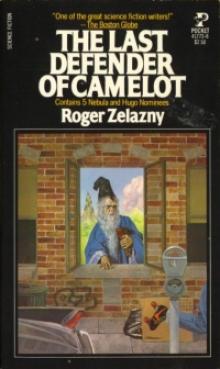 The Last Defender Of Camelot
The Last Defender Of Camelot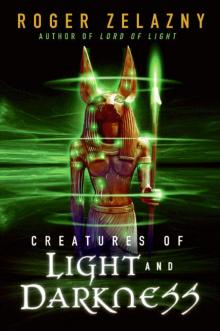 Creatures of Light and Darkness
Creatures of Light and Darkness This Immortal
This Immortal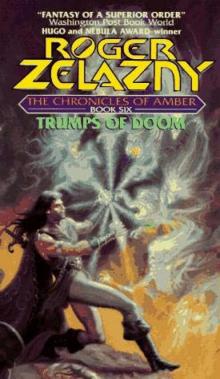 Trumps of doom tcoa-6
Trumps of doom tcoa-6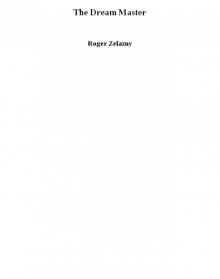 The Dream Master
The Dream Master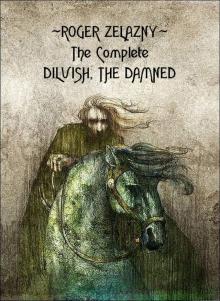 The Complete Dilvish, The Damned
The Complete Dilvish, The Damned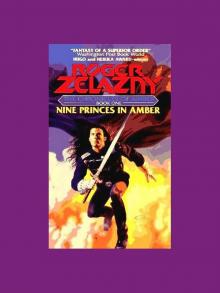 Nine Princes in Amber
Nine Princes in Amber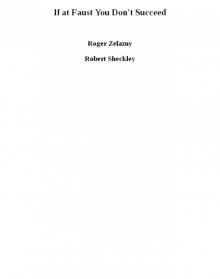 If at Faust You Don't Succeed
If at Faust You Don't Succeed Here there be dragons
Here there be dragons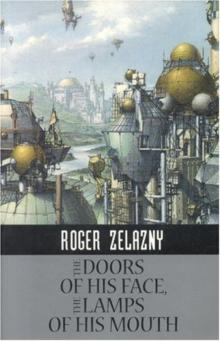 The Doors Of His Face, The Lamps Of His Mouth
The Doors Of His Face, The Lamps Of His Mouth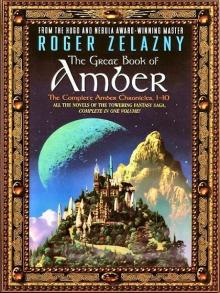 The Great Book of Amber - Chronicles 1-10
The Great Book of Amber - Chronicles 1-10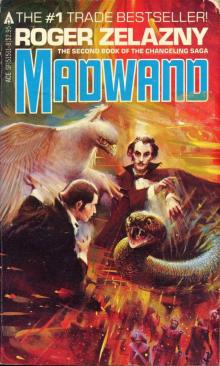 Madwand (Illustrated)
Madwand (Illustrated)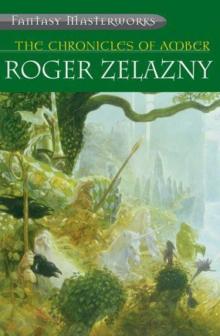 The Chronicles of Amber
The Chronicles of Amber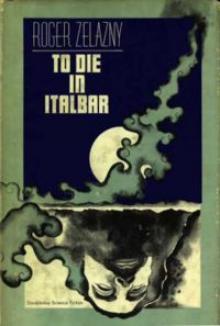 To Die In Italbar
To Die In Italbar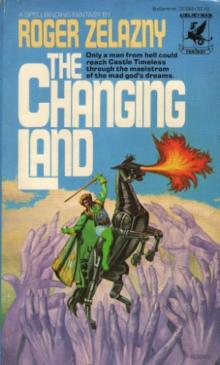 The Changing Land
The Changing Land The Furies
The Furies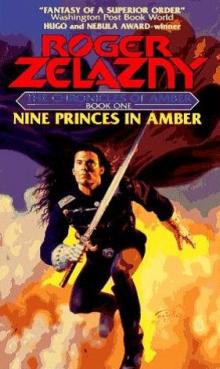 Nine Princes In Amber tcoa-1
Nine Princes In Amber tcoa-1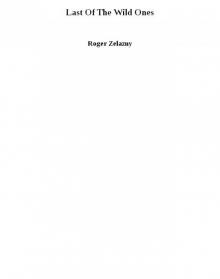 Last Of The Wild Ones
Last Of The Wild Ones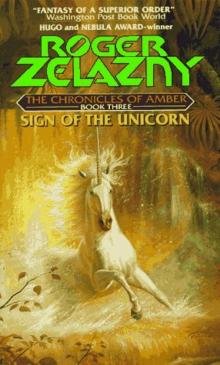 Sign of the Unicorn tcoa-3
Sign of the Unicorn tcoa-3 My Name is Legion
My Name is Legion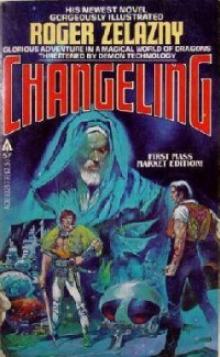 Wizard World 1: Changeling
Wizard World 1: Changeling Changeling
Changeling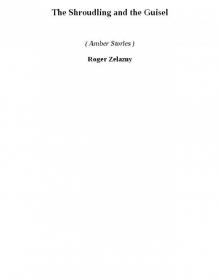 The Shroudling and the Guisel (amber stories)
The Shroudling and the Guisel (amber stories)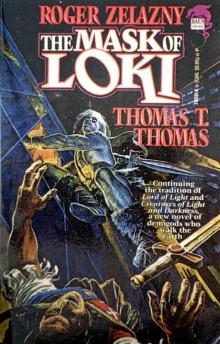 The Mask of Loki
The Mask of Loki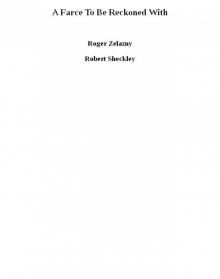 A Farce To Be Reckoned With
A Farce To Be Reckoned With Roadmarks
Roadmarks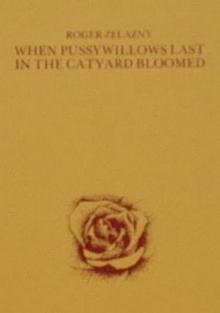 When Pussywillows Last in the Catyard Bloomed (rtf)
When Pussywillows Last in the Catyard Bloomed (rtf)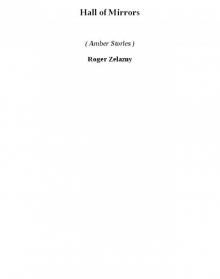 Hall of Mirrors (amber stories)
Hall of Mirrors (amber stories)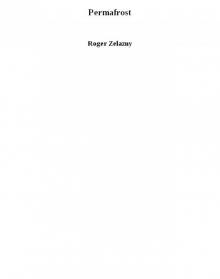 Permafrost
Permafrost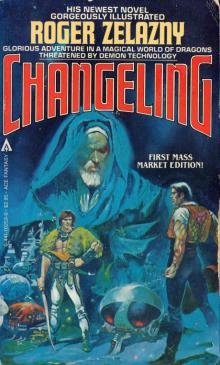 Changeling (Illustrated)
Changeling (Illustrated)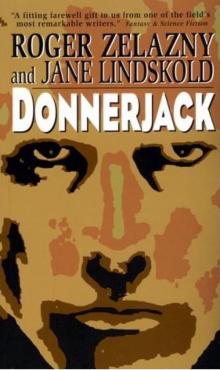 Donnerjack
Donnerjack Shadows & Reflections: A Roger Zelazny Tribute Anthology
Shadows & Reflections: A Roger Zelazny Tribute Anthology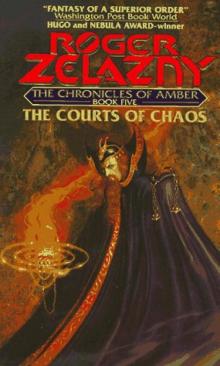 The Courts Of Chaos tcoa-5
The Courts Of Chaos tcoa-5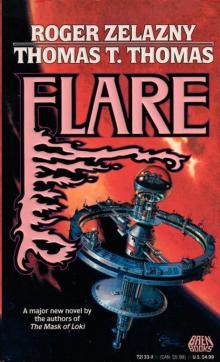 Flare
Flare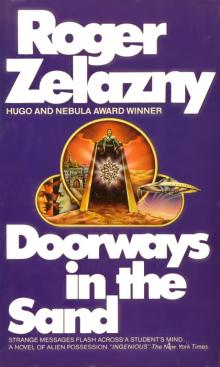 Doorsways in the Sand
Doorsways in the Sand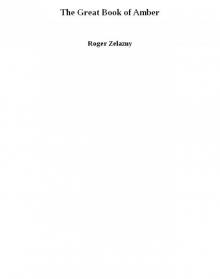 The Great Book of Amber
The Great Book of Amber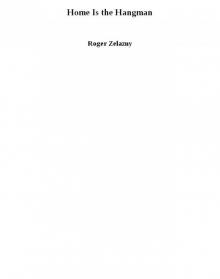 Home Is the Hangman
Home Is the Hangman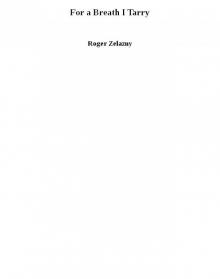 For a Breath I Tarry
For a Breath I Tarry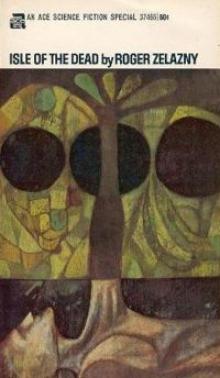 Isle Of The Dead
Isle Of The Dead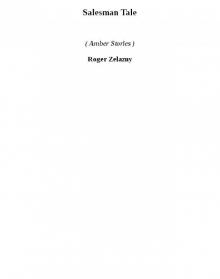 Salesman Tale (amber stories)
Salesman Tale (amber stories) Dismal Light
Dismal Light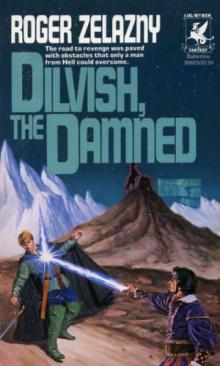 Dilvish, The Damned
Dilvish, The Damned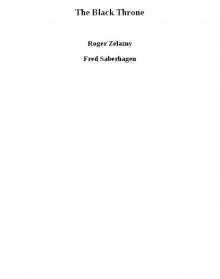 The Black Throne
The Black Throne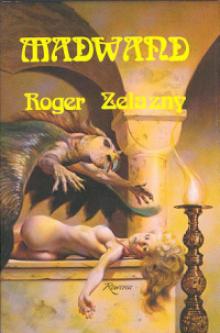 Wizard World 2: Madwand
Wizard World 2: Madwand The Salesman's Tale
The Salesman's Tale